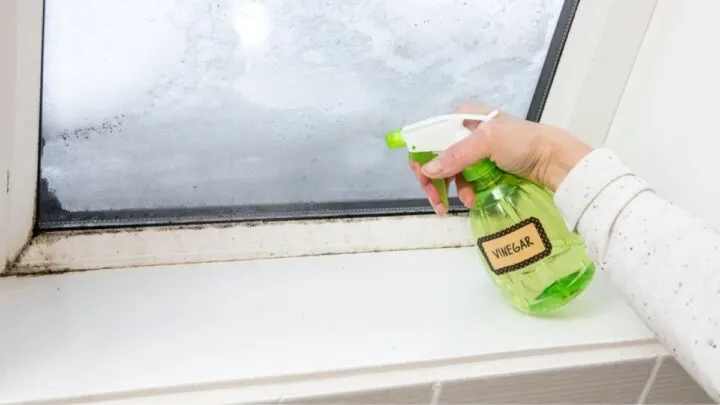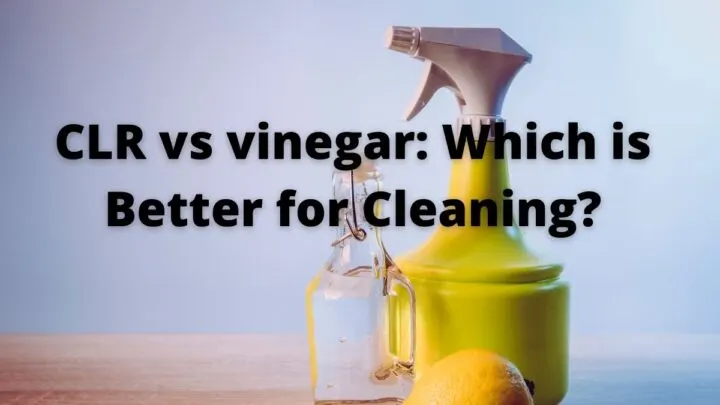Do you have tough stains to get rid of? This often raises a debate about CLR vs. vinegar, which are the two toughest stain cleaners that work on many surfaces.
Some stains are so harsh that not every ordinary stain cleaner can remove them, leaving us with wasted time and energy.
There are several methods for making a good stain cleaner at home by mixing different items.
However, not everyone has the time to do so, and we want a one-stop-shop formula to make our lives easier.
Both CLR and vinegar are great for cleaning many surfaces and stains, but CLR is a chemical cleaner with 15 times more concentration and enhanced qualities to beat tougher stains, including hard rust.
Vinegar is a natural cleaner, so it is safer to use and does not cause damage to the item, but it is less effective.
While CLR is a chemical-based cleaner with more intense and quicker effectiveness, it is better to use vinegar with some items such as dishwashers and washing machines.
CLR and vinegar are two of the most effective cleaners, putting consumers in an anxious position to choose the best one for their homes.
So, we talked to some cleaning experts to settle the debate!
This guide talks about the results of both cleaners on different surfaces so you know which is best.
CLR vs. Vinegar: Usage and Effects
Below, we discuss how CLR and vinegar work on different items.
1. Showerhead
The top of the showerhead is a particularly ignored area that gathers a lot of dirt and debris, making it a breeding ground for bacteria.
But the inside also collects dust and other pollutants that can reduce the water flow.
Some bacteria formed in the showerhead can be dangerous to your health, so you should clean it regularly.
Fortunately, you can clean the showerhead with both CLR and vinegar.
If you clean it regularly, vinegar will do the job as long as no rigid blockers are gathered, like rust and gunk.
But if that is the case, you will probably need CLR to clean the showerhead.
2. Dishwasher
A dishwasher can be cleaned with both cleaners, but some find vinegar more convenient, as you can leave the dishes and racks in the machine and wash them with the dishwasher, since vinegar is a natural cleaner and won’t be harmful.
When cleaning the dishwasher with vinegar, ensure that you have wiped it with a wet cloth and gotten rid of food residues and other items.
Place the vinegar in a dishwasher-safe bowl and run a hot cycle. You will find a sparkling clean dishwasher after it has done the job.
However, the dishwasher can endure harsher stains over time and some food residues that do not clean easily. Rust can also get hold of the dishwasher. In that case, a CLR cleaner will provide a more comprehensive and fine cleaning.
3. Coffeemaker
Coffee stains are one of the hardest to get rid of. However, it is unwise to use a harsh and chemical-based cleaner like CLR to clean the coffeemaker, as you will be consuming the coffee made in the machine.
CLR can be harmful, especially if it is not cleaned correctly.
On the other hand, vinegar will do a fine job if you clean the coffeemaker regularly and without letting the machine dry off after using.
Dried residues are harder to clean, so you should clean the machine quickly after usage.
You can still clean the machine’s exterior with a CLR cleaner by dumping it on a cloth to wipe the machine.
Spraying liquid on a machine is not the best idea. However, the insides should only be cleaned with vinegar.
4. Toilet
The CLR cleaner will damage the porcelain finish on your toilet if it is left on for too long. Ideally, you should wash the cleaner after two minutes to protect your toilet from cleaner stains.
However, even CLR might not be effective on the toilet for under two minutes as it contains many bacteria’s and rigid stains.
Vinegar is the better choice here to protect the toilet.
However, it might not be much effective by itself. For better results, mix a spoon of baking soda in the vinegar.
You can also leave the solution on for longer without damaging the toilet, providing a better result.

5. Washing Machine
Machines like the dishwasher and washing machine are easy to clean as they have a hot setting, which is highly effective in removing stains without tougher cleaners.
Vinegar combined with hot water will be enough to get rid of stains and bacteria.
On the other hand, vinegar will be ineffective on rust and other rigid stains. Therefore, CLR is a better option if these are present in the machine.
Moreover, the water dilution will tone down the chemical effect, so it poses less risk of damaging the machine and leaving residuals that might harm your clothes.
When using the CLR to clean a washing machine, it is crucial to ensure that there are no other chemicals in the machine that might harmfully react when mixed with the CLR.
What Should You Not Use CLR On?
It is clear that CLR is a better choice to get rid of harsher stains, but you should also avoid using it for different items until the vinegar is doing a poor job.
However, there are some items that you should never clean with CLR. These include:
- Refrigerator
- Stone or marble
- Plastic surfaces
- Painted surfaces
This is because CLR is a highly concentrated chemical, and cleaning these items can ruin their appearance and function.
Summing Up CLR vs. Vinegar
CLR and vinegar are both cleaners that work differently on varying surfaces and appliances.
For the most part, vinegar will be better for cleaning appliances like the coffeemaker, stove, and dishwasher, as these are all things you eat or drink out of.
CLR is more effective for tougher stains, but you need to be careful what you use it on. Make sure you use this guide to know what you should use it on and what you shouldn’t!


